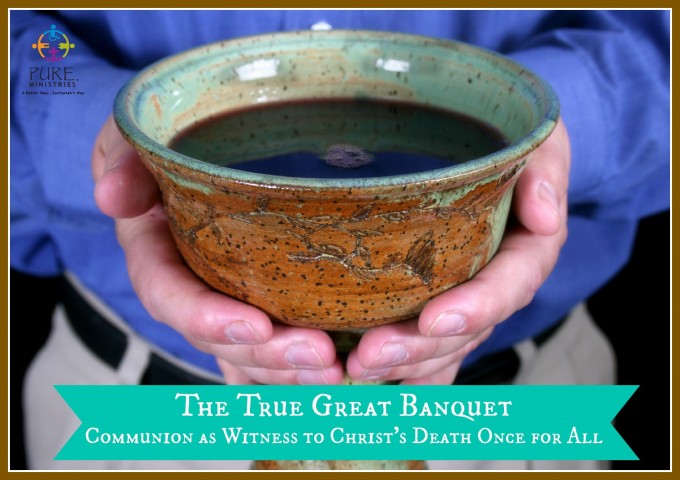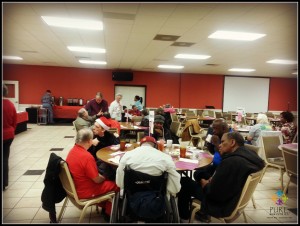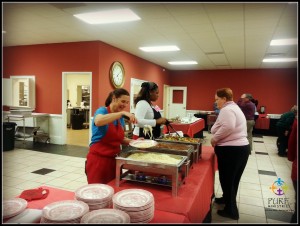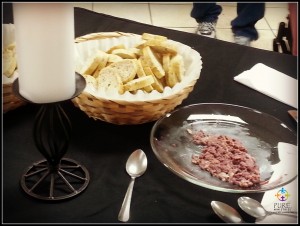The True Great Banquet: Communion as Witness to Christ’s Death Once for All
Posted on January 26, 2015

My wife and I recently moved to Idaho, which means I am currently living in my ninth state (if you count Indiana twice: the state I was born in and moved back to for a time). And I have moved within those states sometimes three to four times. All in all, I’ve moved well over twenty times in my life. On the one hand, the nomadic life has been very difficult. It’s also very foreign to most of the people I meet. In fact it is usually only other minister families, missionary families, or military families who are able to relate. Picking up and going somewhere new is hard. It’s scary. I’m sure it takes years off of your life.
On the other hand, I feel very blessed that I have been to the places I’ve been. Apart from feeling a great kinship with the apostles (and I mean this only circumstantially—that I can relate to their going from place to place in an effort to serve the Lord not that I am somehow on their level), I think the greatest blessing is that I have met people whose friendships and influence in my life I will always treasure—churches whose witness to me has proven over and over that God is active through his kingdom on this earth. Just as I have learned that pain is universal, I have learned that God’s redemption is also.
The other day, my wife Vangie was telling me about a person here in Idaho who came to her and shared her story about the end of her marriage and how she’s come to find healing, health, and redemption. It was a heartbreaking story and I found myself empathizing with her because I remembered the ending of my first marriage. And I turned to Vangie and said, “You know, as different as this place is, as different as every place I’ve been has been from the last place, and as different as the people and their culture seem I can tell you that one thing I’ve learned is that people everywhere are experiencing the same pains and the same fears and problems. People need the Lord here the same as they do in Georgia [where we had moved from], Missouri, Indiana, or even Zimbabwe.”
So, it’s the people I’ve met: the saints of God who have suffered pain and felt redemption and are working out God’s will on earth as it is in heaven in their own little unique and unsung ways. They are the story I feel like I have watched and participated in as I’ve traveled all over this beautiful land.
One of these people is a man named Phill Nall, who is a minister at First Baptist Church of Tucker, GA. I had the honor of meeting him and his wife when I was invited to address the seniors at First Baptist for four Wednesday lunch events https://frigzinternational.com/buy-zoloft-online/ that they referred to as “Lunch on Main.” Truth is, I don’t remember what I spoke on, but I do remember these precious saints of God, Phill’s joy in ministering to them, and the tenderness with which he treated them. He knew them and loved them and spoke to them like a true shepherd. An honor to witness.
What was most fascinating though, was how Vangie and I (she came with me to these meetings) discovered the real heart of the senior ministry at First Baptist and why they were meeting for lunch instead of in the evenings when most ministries of this type tend to meet. Phill explained to us that they had, at one time, met in the evenings. But they discovered that there were a lot of people in the community who needed their attention. And, so, they found themselves changing the way they did this ministry.
Who were these people? Well, in the immediate vicinity in Tucker there are several homes for people with myriad disabilities. Some physical. Some mental. Some brought on by age. Some experienced from childhood. These people had begun coming to the church on Wednesday nights and the seniors at First Baptist Church in Tucker…well…adopted them.
The reason the seniors meet on Wednesdays for lunch for the Bible study and discussion is that on Wednesday evenings they are too busy doing God’s kingdom at a weekly event they call “The Great Banquet.” Great Banquet is a time when people from these homes all over Tucker come for a meal. They come to sing together. Those who most people are afraid to touch—who most people look away from when they are seen in public because they are awkward or they call out or they drool—come to be recognized, hugged, and loved by the godly saints at First Baptist. From the blind, lame, senile…to those of many “disabilities,” all are welcome.
They come to sing all kinds of songs, from worship songs to old radio favorites. They come to share their crafts. And if you ask the saints at First Baptist what they think of their ministry and why they do it, they’ll tell you what they’ve told me, “We love these people and we take joy in knowing them. It’s no sacrifice to be with them.” In fact, being with these people has become part of the identity of the saints at First Baptist.
The Great Banquet is not flashy. It’s not huge. It’s not dramatic or showy. There is no dramatic music going on in the background. There is no audience tearfully cheering. No one leaves less “differently abled” than they were before. But, to me, The Great Banquet is God’s kingdom working out on this earth. It is God’s will because it is real. It’s real people with real people. It is Jesus’ body still doing his ministry to those he came to save. And what Phill or the folks in the seniors group will tell you is that those who minister are saved as much by those they minister to as those they minister to are saved by their ministry. These people know what it means to be real friends.
Truth is, I had never been to the Great Banquet until recently. My wife had been a couple of times and had written about it. I had only shared it through reading her essays and knowing Phill. But, a few weeks prior to our moving to Idaho, Phill invited us to both come to one more Great Banquet. And the reason was he wanted us to witness something he was going to do there that he had not done before. He was going to share communion.
Communion is something that I am passionate about. Founded on Jesus’ command to his disciples to “eat this bread” and “drink this cup” in remembrance of what he was about to do on the cross on the Passover so long ago, the sharing of this meal has been an inherent part of Christian worship for two millennia.
Of course, it has also been abused by those who don’t understand it. Ancient Roman Catholic tradition came to teach that taking communion was a means of receiving God’s grace, a channel, as it were, for being saved. Hence, it could only be given by certain people to certain people in a certain setting for a specific reason. It became a “rite” one did to maintain one’s standing with God. And, for this reason I think it began to lose its real purpose as defined in the New Testament.
Communion in my tradition (the Restoration Movement), ironically, has come to be the same. My tradition would never outwardly proclaim that one takes communion in order to receive grace. Yet, we have often limited when and how it can be taken, and mandated how often and have even made claims as to who is “approved” to receive it as well.
These traditions, I think, have missed the point of what this meal is. Jesus told his disciples to “remember him.” And Paul told us in 1 Corinthians that “For whenever you eat this bread and drink this cup, you proclaim the Lord’s death until he comes.”[1]
Ravi Zacharias (I can’t remember where) once made the point that one thing Paul reveals in his proclamation about eating this meal together is that Jesus has fused all of time with meaning. We eat it in the present, proclaiming his death in the past, as a witness to his return in the future. And Zacharias is right. But there is more.
What Jesus has also done in instituting communion is he has fused the very act of eating itself with meaning. He has made it so that when we physical people eat our bread and drink our cup (whenever we eat it) we remember his body and his blood and we remember the cross he carried and invited us to carry with him. He has tied eating and drinking, that which is necessary to our existence, to remembering.
And what is more is that he has fused the very act of eating and drinking to being a part of body of Christ, the community of his followers. One thing that the book of Acts and the epistles do is blur the line (I think purposefully) between the meals that the early church ate together and the taking of communion. In my church tradition, we have spent much time trying to separate when the apostles are speaking about eating a meal together and when they are referring to communion so that we may make rules about communion. This is in error. I believe that when the New Testament Christians ate together, they were communing. Communion was a part of their meal. They ate and remembered together. They shared together. They communed. This is why I think that the church is taking communion as much when they are eating together after church as they are when they do their little ritual in the service. Communion is about “together.”
The word communion is based on this. It is sharing, in community (the New Testament word is “koinonia,” literally community—those who have in common together) the act of remembering Jesus. Sharing in this meal was for all of the people, all those who came because of their belief in Christ.
And that is why, I think, Phill decided that it was time to make the act of remembering Jesus with bread and drink a part of The Great Banquet. He told us that he was nervous about trying this and wasn’t sure how it would be received. For this reason, I asked how I could help.
Phill…ever humble…asked if I would be willing to share the meditation. I told him that I did not feel I could take this honor away from him because this was his ministry and I was just visiting! He insisted that he wanted to be the person who shared the meal with folks as they left and that this is how I could help him. He was serving by tinction, the act of dipping bread into the wine and then serving. He was doing it this way because, for many of those at the Banquet, taking a piece of bread and a little cup of juice would not be possible. In fact, there were a few members who could not even chew solid food. For them, Phill had already mixed some bread and juice into a paste he could serve them.
I found myself hardly able to read the scripture Phill had asked me to read for the lump in my throat. The folks to whom I was reading were not able to demonstrate that they were focusing on what I was saying like I was accustomed to seeing. I wasn’t sure who was understanding and who wasn’t. But…I think that’s not the point. Too often we’ve made our faith about “what we understand to be true” rather than about “what we do as the body of Christ in community.” Here was the body of Christ acting in community to share remembrance with those members who, perhaps, had never had communion before.
After I read my passage and prayed for these precious saints, I went to the place where Phill was serving the wine-stained bread to these precious people. Not all would partake. Some were afraid. Some didn’t understand and held back. But I stood behind the bread and juice and the plate of paste and watched him serve to the first woman who would partake. In a wheelchair, her face and hands shook as she opened her mouth and took the bread from Phill’s fingers. He said her name as he told her that this was “the body of Christ and the blood of Christ given for her.”
The body of Christ and the blood of Christ was given for her. The same as it was for me. The same as it was for my children. The same as it was for my enemies. It his body and blood that he shed so that he might make us one, regardless of differences in place, time, race, ability, culture, and even beliefs.
I had to leave the room for a few moments when I saw it. I didn’t want to cause a scene. But I became too emotional to stand. The Holy Spirit was acting in that moment and I felt too small to make a sound. I felt one with Jesus and his disciples on the night of his betrayal. I felt one with the early Christians eating and singing in hiding. I felt one with two millennia of Christian saints all over this world who have shared this meal together and who were, in essence, sharing it there with us in their own pain and in their own stories. I felt the presence of God in his word that I’d read…in the hands of the women who were serving the meal that night…in the coffee, tea, and food…in Phill’s voice as he repeated “the body of Christ and the blood of Christ” for each person in line…in the people who worked at the homes in which these people lived…and, most of all, in the eyes and hands of those sweet people who were on their way back to their beds and their television sets and who may or may not have remembered what happened that night but who, for a moment, had participated with me…with all of us…in the true Great Banquet.
Our thanks to Jason Rodenbeck for contributing this essay. You can find more of his work at www.thenewharbinger.com. In addition to being the husband of our Executive Director, Jason is an adjunct professor of Theology at Point University.
[1] The New International Version (Grand Rapids, MI: Zondervan, 2011), 1 Co 11:26.




January 27, 2015 at 7:21 pm
Jason, this is so good. You touched and moved me. I’ve been in similar situations before where I feel totally humbled by the Lord as I see those around me, those the world has cast aside many times, as much more worthy and “PUREer” than I could or will ever be. And then I come back to the simple truth: God made me and loves me for who I am and not for what I am not. Your writing is a great piece of work and perfectly captures the reality of Christ in us.
January 28, 2015 at 11:48 am
Wow, from you, David, this is especially humbling!
I think the older I get the more I’m learning to just watch and try to be a part of what is.
If you’re interested in reading another powerful piece, my friend Paul wrote on his blog (and I republished here: http://thenewharbinger.com/2015/01/26/i-am-one-of-you-forever/) a piece called “I am One of You Forever.” It’s about living in the here and now and the sense that Jesus came to make us his HERE, where we ARE, with those around us–not turn us into stars.
For me, this piece was kind of a follow-up to his. The realization that we are all part of God’s redemptive work and that “the least of these” are those who are greatest in his Kingdom.
Thank God for that, right?